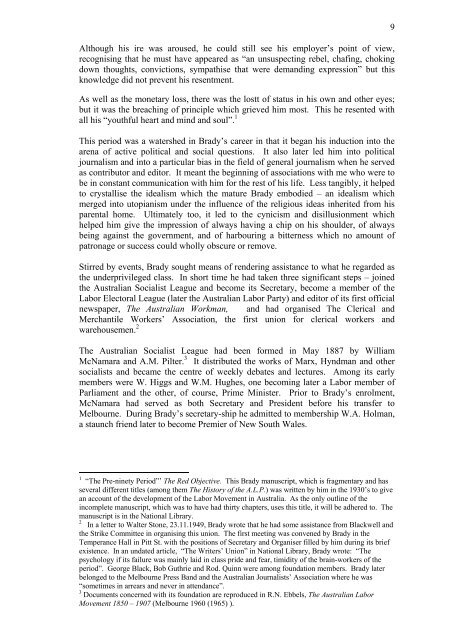A CRITICAL BIOGRAPHY OF EDWIN JAMES BRADY - Mallacoota ...
A CRITICAL BIOGRAPHY OF EDWIN JAMES BRADY - Mallacoota ...
A CRITICAL BIOGRAPHY OF EDWIN JAMES BRADY - Mallacoota ...
You also want an ePaper? Increase the reach of your titles
YUMPU automatically turns print PDFs into web optimized ePapers that Google loves.
Although his ire was aroused, he could still see his employer’s point of view,<br />
recognising that he must have appeared as “an unsuspecting rebel, chafing, choking<br />
down thoughts, convictions, sympathise that were demanding expression” but this<br />
knowledge did not prevent his resentment.<br />
As well as the monetary loss, there was the lostt of status in his own and other eyes;<br />
but it was the breaching of principle which grieved him most. This he resented with<br />
all his “youthful heart and mind and soul”. 1<br />
This period was a watershed in Brady’s career in that it began his induction into the<br />
arena of active political and social questions. It also later led him into political<br />
journalism and into a particular bias in the field of general journalism when he served<br />
as contributor and editor. It meant the beginning of associations with me who were to<br />
be in constant communication with him for the rest of his life. Less tangibly, it helped<br />
to crystallise the idealism which the mature Brady embodied – an idealism which<br />
merged into utopianism under the influence of the religious ideas inherited from his<br />
parental home. Ultimately too, it led to the cynicism and disillusionment which<br />
helped him give the impression of always having a chip on his shoulder, of always<br />
being against the government, and of harbouring a bitterness which no amount of<br />
patronage or success could wholly obscure or remove.<br />
Stirred by events, Brady sought means of rendering assistance to what he regarded as<br />
the underprivileged class. In short time he had taken three significant steps – joined<br />
the Australian Socialist League and become its Secretary, become a member of the<br />
Labor Electoral League (later the Australian Labor Party) and editor of its first official<br />
newspaper, The Australian Workman, and had organised The Clerical and<br />
Merchantile Workers’ Association, the first union for clerical workers and<br />
warehousemen. 2<br />
The Australian Socialist League had been formed in May 1887 by William<br />
McNamara and A.M. Pilter. 3 It distributed the works of Marx, Hyndman and other<br />
socialists and became the centre of weekly debates and lectures. Among its early<br />
members were W. Higgs and W.M. Hughes, one becoming later a Labor member of<br />
Parliament and the other, of course, Prime Minister. Prior to Brady’s enrolment,<br />
McNamara had served as both Secretary and President before his transfer to<br />
Melbourne. During Brady’s secretary-ship he admitted to membership W.A. Holman,<br />
a staunch friend later to become Premier of New South Wales.<br />
1 “The Pre-ninety Period”’ The Red Objective. This Brady manuscript, which is fragmentary and has<br />
several different titles (among them The History of the A.L.P.) was written by him in the 1930’s to give<br />
an account of the development of the Labor Movement in Australia. As the only outline of the<br />
incomplete manuscript, which was to have had thirty chapters, uses this title, it will be adhered to. The<br />
manuscript is in the National Library.<br />
2 In a letter to Walter Stone, 23.11.1949, Brady wrote that he had some assistance from Blackwell and<br />
the Strike Committee in organising this union. The first meeting was convened by Brady in the<br />
Temperance Hall in Pitt St. with the positions of Secretary and Organiser filled by him during its brief<br />
existence. In an undated article, “The Writers’ Union” in National Library, Brady wrote: “The<br />
psychology if its failure was mainly laid in class pride and fear, timidity of the brain-workers of the<br />
period”. George Black, Bob Guthrie and Rod. Quinn were among foundation members. Brady later<br />
belonged to the Melbourne Press Band and the Australian Journalists’ Association where he was<br />
“sometimes in arrears and never in attendance”.<br />
3 Documents concerned with its foundation are reproduced in R.N. Ebbels, The Australian Labor<br />
Movement 1850 – 1907 (Melbourne 1960 (1965) ).<br />
9


